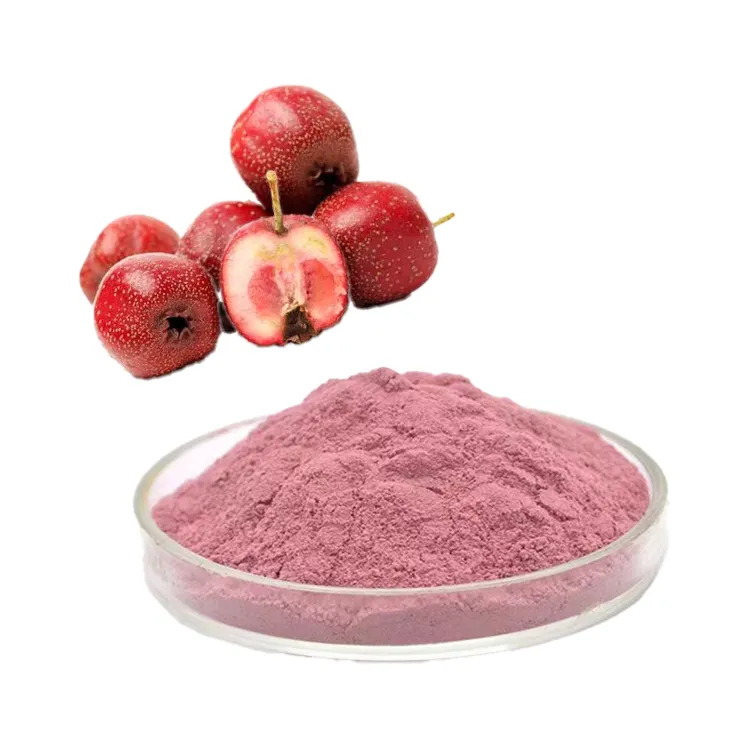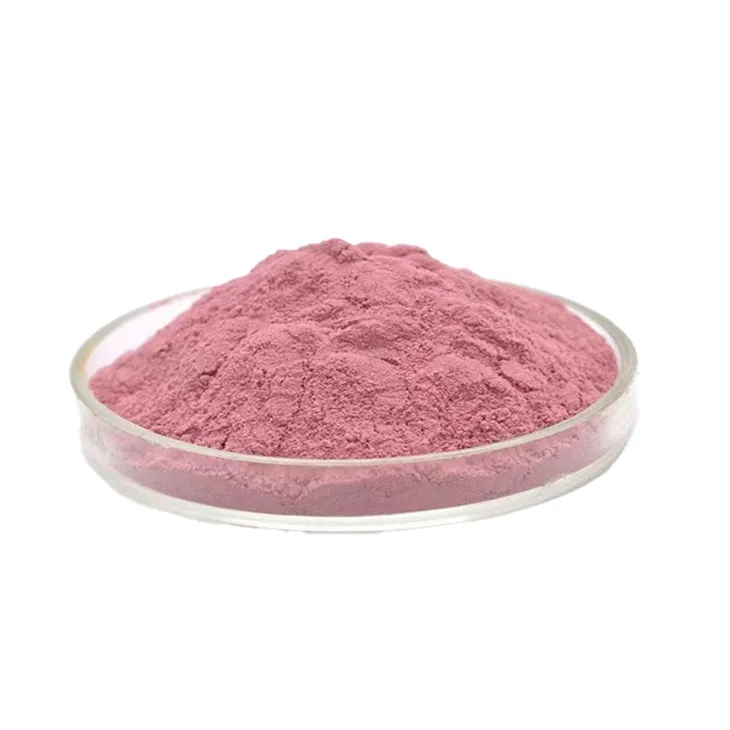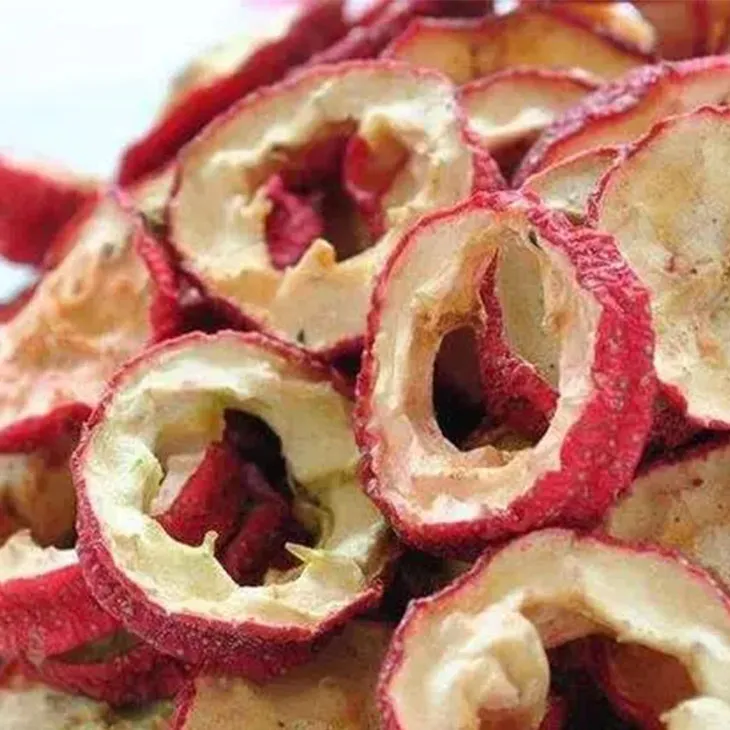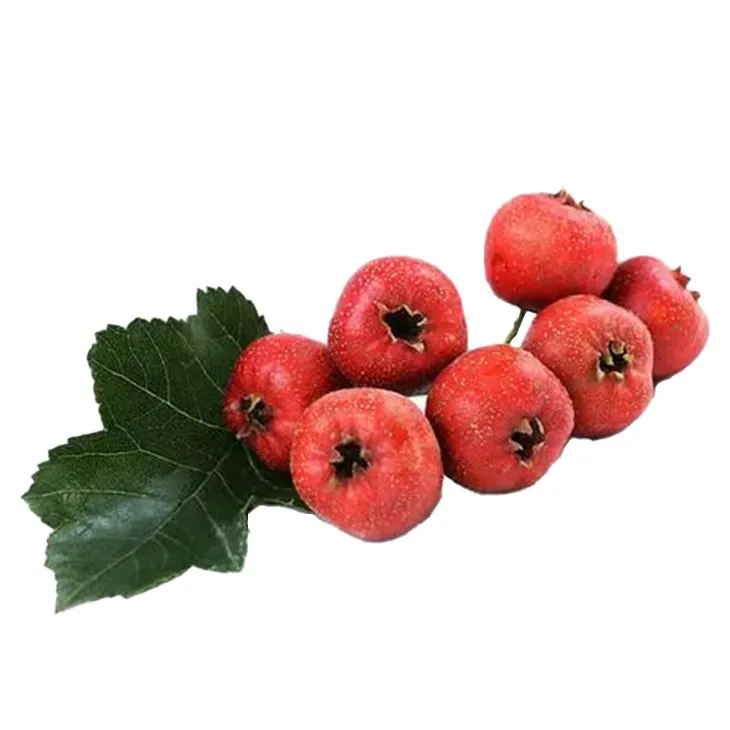- 0086-571-85302990
- sales@greenskybio.com
The Application of Hawthorn Powder in Skin Care.
2024-11-13

1. Introduction to Hawthorn powder
Hawthorn, a well - known plant, has been used in traditional medicine for centuries. Hawthorn powder is made by grinding dried hawthorn fruits or leaves. It is rich in a variety of nutrients and bioactive compounds, which play an important role in skin care.
The main nutrients in Hawthorn powder include vitamins such as vitamin C, vitamin E, and B - group vitamins. Vitamin C is a powerful antioxidant that can help protect the skin from free radical damage. Vitamin E also has antioxidant properties and can help maintain skin elasticity. B - group vitamins are involved in various metabolic processes in the skin cells.
In addition to vitamins, hawthorn powder also contains flavonoids, phenolic acids, and other bioactive compounds. Flavonoids have anti - inflammatory, antioxidant, and anti - microbial properties. Phenolic acids can also contribute to antioxidant and anti - aging effects.

2. Anti - aging Effects of Hawthorn Powder
Free Radical Scavenging
One of the major causes of skin aging is the damage caused by free radicals. Free radicals are unstable molecules that can react with various components in the skin cells, such as DNA, proteins, and lipids. This reaction can lead to cell damage, mutation, and ultimately aging of the skin.
Hawthorn powder, with its rich content of antioxidants like vitamin C and flavonoids, can effectively scavenge free radicals. These antioxidants can donate electrons to free radicals, making them stable and thus preventing them from causing further damage to the skin cells.
Stimulation of Collagen Production
Collagen is an important protein in the skin that provides structural support. As we age, the production of collagen in the skin decreases, leading to wrinkles, sagging skin, and loss of elasticity.
Studies have shown that certain components in hawthorn powder can stimulate the production of collagen in fibroblasts (cells in the skin that produce collagen). For example, flavonoids can activate specific signaling pathways in fibroblasts, which in turn upregulates the expression of genes related to collagen synthesis.

3. Improving Skin Texture
Exfoliation
Hawthorn powder can be used as a natural exfoliating agent. The fine particles of the powder can gently remove dead skin cells from the surface of the skin. Dead skin cells can accumulate on the skin surface, making it look dull and rough.
When used as an exfoliant, hawthorn powder can improve the skin's texture, making it smoother and more radiant. It is a milder alternative to some chemical exfoliants, which may be too harsh for some skin types.
Moisturizing
Although hawthorn powder may not be as rich in lipids as some traditional moisturizers, it can still contribute to skin hydration. Some of the compounds in hawthorn powder can help improve the skin's barrier function.
The skin barrier is crucial for preventing water loss from the skin. By enhancing the skin barrier, hawthorn powder can help the skin retain moisture, resulting in a softer and more supple texture.

4. Treating Minor Skin Problems
Anti - inflammatory Properties for Acne
Acne is a common skin problem that is often associated with inflammation. The flavonoids and phenolic acids in hawthorn powder have anti - inflammatory properties.
When applied to the skin, hawthorn powder can help reduce the redness, swelling, and pain associated with acne. It can also regulate sebum production, as excessive sebum can clog pores and contribute to acne formation.
Healing of Minor Cuts and Abrasions
Hawthorn powder may have some properties that can promote the healing of minor cuts and abrasions. Some of its bioactive compounds may have antibacterial effects, which can prevent infection in the wound area.
Moreover, the nutrients in hawthorn powder can support the regeneration of skin cells in the damaged area, speeding up the healing process.

5. Methods of Using Hawthorn Powder in Skin Care
5.1. Face Masks
Hawthorn and Honey Mask
- Mix hawthorn powder with honey in a ratio of 1:2. Honey has moisturizing and antibacterial properties.
- Apply the mixture evenly on the face, avoiding the eye area.
- Leave it on for 15 - 20 minutes and then rinse off with warm water.
Hawthorn and Yogurt Mask
- Combine hawthorn powder with plain yogurt in a 1:3 ratio. Yogurt contains lactic acid, which can help exfoliate the skin.
- Spread the mixture on the face and let it sit for 10 - 15 minutes.
- Wash it off gently with lukewarm water.
5.2. Body Scrubs
- For a body scrub, mix hawthorn powder with a carrier oil such as olive oil or almond oil in a ratio of 1:1.
- Gently massage the mixture onto the body in circular motions, focusing on areas with rough skin like elbows and knees.
- Rinse off with warm water.
5.3. Tonic Solutions
- Prepare a hawthorn powder tonic by steeping hawthorn powder in boiling water for 10 - 15 minutes.
- Let it cool down and then use a cotton ball to apply it to the face as a toner. This can help tighten pores and balance the skin's pH.
6. Precautions and Considerations
Patch Test
Before using hawthorn powder on a large area of the skin, it is advisable to perform a patch test. Apply a small amount of the hawthorn powder mixture on a small area of the skin, such as the inner forearm, and wait for 24 - 48 hours. If there is any redness, itching, or irritation, do not use it on the face or body.
Allergies
Although hawthorn is generally considered safe, some people may be allergic to it. If you have a known allergy to hawthorn or related plants, avoid using hawthorn powder in skin care products.
Quality of Hawthorn Powder
Ensure that the hawthorn powder is of high quality. It should be sourced from reliable suppliers and should be free from contaminants such as pesticides and heavy metals.
7. Conclusion
Hawthorn powder has great potential in skin care. Its anti - aging, skin texture - improving, and minor skin problem - treating properties make it a valuable addition to natural skin care products. However, proper precautions should be taken when using it to ensure safety and effectiveness.
FAQ:
Q1: How does hawthorn powder contribute to anti - aging in skin care?
Hawthorn powder contains antioxidants such as flavonoids. These antioxidants help to neutralize free radicals in the skin. Free radicals can damage skin cells and accelerate the aging process. By combating free radicals, hawthorn powder can reduce the appearance of wrinkles, fine lines, and improve skin elasticity, thus contributing to anti - aging.
Q2: Can hawthorn powder really improve skin texture?
Yes, it can. Hawthorn powder has certain nutrients and bioactive substances. For example, it may help in exfoliating dead skin cells gently due to its natural properties. It also promotes better blood circulation in the skin. Improved blood circulation means more oxygen and nutrients are delivered to the skin cells, which can result in a smoother and more even skin texture.
Q3: What minor skin problems can hawthorn powder treat?
Hawthorn powder may be helpful for treating minor inflammations on the skin. It has anti - inflammatory properties which can soothe irritated skin. It may also be beneficial for dealing with mild acne as it can help to balance the skin's sebum production and reduce the growth of acne - causing bacteria.
Q4: How is hawthorn powder applied in skin care?
It can be applied in various ways. One common method is to make a paste by mixing hawthorn powder with water or other natural ingredients like honey or aloe vera gel. This paste can be directly applied to the face or other parts of the skin as a mask. It can also be added to homemade creams or lotions in a proper proportion for regular skin application.
Q5: Are there any potential side effects of using hawthorn powder on the skin?
While hawthorn powder is generally considered safe for topical use, some people may be allergic to it. Before using it on a large area of the skin, it is advisable to do a patch test on a small area of the skin, such as the inner side of the forearm. If there is any redness, itching or swelling within 24 hours, it means an allergic reaction may be occurring and its use should be discontinued.
Related literature
- The Nutritional and Therapeutic Properties of Hawthorn in Cosmetics"
- "Hawthorn Extracts: New Insights into Their Role in Skin Health"
- ▶ Hesperidin
- ▶ citrus bioflavonoids
- ▶ plant extract
- ▶ lycopene
- ▶ Diosmin
- ▶ Grape seed extract
- ▶ Sea buckthorn Juice Powder
- ▶ Beetroot powder
- ▶ Hops Extract
- ▶ Artichoke Extract
- ▶ Reishi mushroom extract
- ▶ Astaxanthin
- ▶ Green Tea Extract
- ▶ Curcumin Extract
- ▶ Horse Chestnut Extract
- ▶ Other Problems
- ▶ Boswellia Serrata Extract
- ▶ Resveratrol Extract
- ▶ Marigold Extract
- ▶ Grape Leaf Extract
- ▶ blog3
- ▶ blog4
- ▶ blog5
-
Organic Tongkat Ali extract powder factory.
2024-11-13
-
How to make powder with ashwagandha extract.
2024-11-13
-
Rosehip extract manufacturers from China.
2024-11-13
-
The best cat's claw extract in nature.
2024-11-13
-
Chinese Dandelion Leaf Extract Suppliers.
2024-11-13
-
Uridine-5'-monophosphate Disodium salt
2024-11-13
-
Lily extract
2024-11-13
-
Pomegranate Extract
2024-11-13
-
Tongkat Ali Extract Powder
2024-11-13
-
Saw Palmetto Extract
2024-11-13
-
Acai Berry Extract
2024-11-13
-
White Willow Bark Extract
2024-11-13
-
Astaxanthin
2024-11-13
-
Milk Thistle Extract
2024-11-13
-
Tongkat Ali Extract
2024-11-13





















